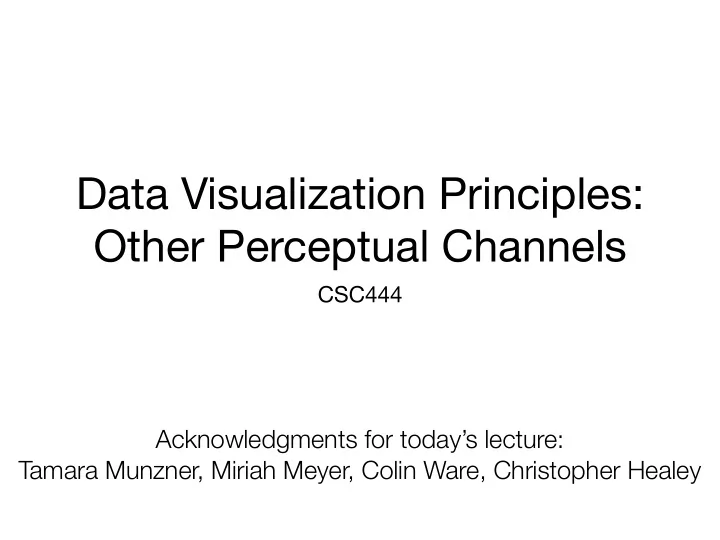

Data Visualization Principles: Other Perceptual Channels CSC444 Acknowledgments for today’s lecture: Tamara Munzner, Miriah Meyer, Colin Ware, Christopher Healey
PREATTENTIVENESS, OR “VISUAL POP-OUT”
ORIENTATION Christopher Healey, http://www.csc.ncsu.edu/faculty/healey/PP/index.html
WIDTH/LENGTH Christopher Healey, http://www.csc.ncsu.edu/faculty/healey/PP/index.html
SIZE Christopher Healey, http://www.csc.ncsu.edu/faculty/healey/PP/index.html
Mixing is not always pre- attentive
Preattentiveness is only simple to understand when considering one channel at a time.
VISUAL CHANNELS YOU SHOULD BE CAREFUL WITH, EVEN IN ISOLATION
3D, when data isn’t • Perspective interacts with size and color judgments • Occlusion is bad, often unnecessary Naomi Robbins, forbes.com
(and maybe even it is!) Daae Lampe et al. TVCG 2009
Animations • We perceive motion, and regularity, even when none might be intended • http://en.wikipedia.org/wiki/File:Lilac-Chaser.gif • And it interacts badly with the rest of our perceptual system
Animations • limit them to data transitions , preferably controlled by interaction www.gapminder.org
GESTALT PRINCIPLES
GESTALT PRINCIPLES • General idea: we interpret stimuli as patterns that are grouped, complete, whole • Even when they aren’t
GESTALT: SIMILARITY We use color to connect things into groups http://www.andyrutledge.com/gestalt-principles-1-figure-ground-relationship.php
GESTALT: PROXIMITY We use distance to connect things into groups http://www.andyrutledge.com/gestalt-principles-1-figure-ground-relationship.php
GESTALT: CLOSURE We see closed shapes, even when they’re not there
GESTALT: CONTAINMENT A B A B A Objects inside closed shapes appear related, even when they’re far apart
GESTALT: CONTAINMENT
GESTALT: CONTINUITY We see simple, connected figure/ground shapes rather than complicated shapes
GESTALT: FIGURE/GROUND We see simple, connected figure/ground shapes rather than complicated shapes
HIGHER-LEVEL CHANNELS WE ARE STILL STUDYING
Overlays for bivariate maps Ware 2009 TVCG
Overlays for bivariate maps Ware 2009 TVCG
Perception of higher-level features • Correlation perception follows Weber’s Law (!) Harrison et al., TVCG 2014
Perception of higher-level features • Correlation perception follows Weber’s Law (!) Harrison et al., TVCG 2014
Perception of higher-level features • Correlation perception follows Weber’s Law (!) Harrison et al., TVCG 2014
Recap • Consider how data behaves • Can you add? Subtract? Compare? Is there a smallest, or are values just di ff erent from one another? Etc. • Consider how the basic visual channels behave, match the two appropriately
• Consider how the basic visual channels behave, match the two appropriately What if they don’t match?
“WEIRD” DATA (A prelude to techniques)
Orientation vs. Direction https://www.ncl.ucar.edu/Applications/evans.shtml
Orientation vs. Direction http://www.datapointed.net/2014/10/ maps-of-street-grids-by-orientation/
Orientation vs. Direction Demiralp et al. 2009
Orientation vs. Direction Demiralp et al. 2009
Orientation vs. Direction This is a bad colormap. Why? Demiralp et al. 2009
Orientation vs. Direction Demiralp et al. 2009
Orientation vs. Direction
Orientation vs. Direction Demiralp et al. 2009
Probability Distributions • Map behavior of conditional distributions, marginal distributions, etc. to visual channels: Product Plots, Wickham and Ho ff man, TVCG 2011
Simpson’s “Paradox”
Simpson’s “Paradox”
Simpson’s “Paradox”
Simpson’s “Paradox”
Recommend
More recommend